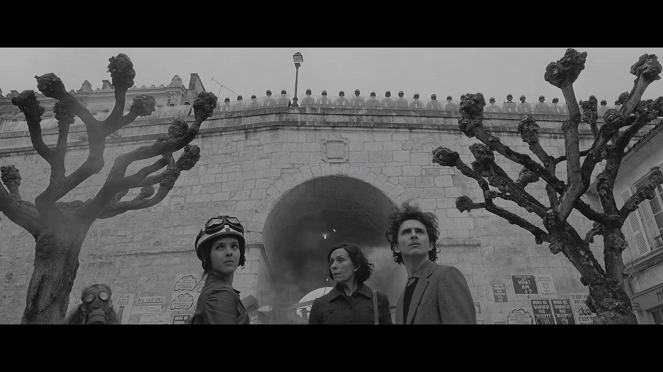Rendező:
Wes AndersonForgatókönyvíró:
Wes AndersonOperatőr:
Robert D. YeomanZeneszerző:
Alexandre DesplatSzereplők:
Benicio Del Toro, Adrien Brody, Tilda Swinton, Léa Seydoux, Frances McDormand, Timothée Chalamet, Jeffrey Wright, Bill Murray, Lyna Khoudri, Owen Wilson (több)Streaming (3)
Tartalmak(1)
A szeretett kansasi születésű szerkesztő, Arthur Howitzer, Jr. halálának alkalmából A Francia Kiadás (egy széles körben terjesztett francia székhelyű amerikai magazin) szerkesztősége ősszegyűlik, hogy nekrológot írjon. A Howitzerhez kötődő emlékekből négy történet elevenedik meg: útinapló a Bicikliző Riportertől a város kétes hírű kerületeiről; “A betonremek”, egy pszichopata festőbűnözőről és az őt őrző nőről, egyben múzsájáról, továbbá rámenős műkereskedőkről; “Egy kiáltvány módosításai”, egy diáklázadás csúcspontján, a barikádok árnyékában esett szerelem és halál krónikája; és “A rendőrkapitány privát étkezője”, egy feszültséggel teli elbeszélés kábítószerről, gyermekrablásról és az étkezés művészetéről. (Fórum Hungary)
(több)Recenziók (8)
After the death of a magazine publisher, the writers find out that their magazine is ending. And in the last issue, besides the obituary, they will publish the best articles about art, politics, and food. Wes Anderson presents a not very interesting bunch of stories about journalists in a form that prevents him from selling what usually makes his films most interesting.
()
A short story tribute to "good old France and reportage journalism" that starts with by far the best story (meaning the Seydoux/Del Toro one, not the introductory one), which makes the others seem a bit unfairly ordinary. Another snag is that they are "one and the same". This is doubly annoying because they are "as if by different authors, each with their own unique style of writing", which should have resulted in each having a clear visual identity. But they are all an amalgamation of styles (different genres, film periods, animation) and therefore they are all indistinguishable from each other. Otherwise, everything is typically Anderson: distinctive poetics, elaborate camerawork, work with pompous mise-en-scene, performances on the edge of caricature, but without slipping into goofiness. Overall, this is so much a Wes Anderson film you’ll know with absolute certainty in advance whether you will like it or not. The only question is how much you'll (dis)like it, since it's a Wes Anderson film that's kind of idling this time.
()
I am surprised by how positively The French Dispatch is received, how willingly the audience jumps on another Wes Anderson dreamy train on the way to their own memories, regrets, and desires. What is missing is that famous step towards the audience, which usually makes such a journey easier through the fantastic world of The Life Aquatic with Steve Zissou or the playful animation of Fantastic Mr. Fox. This time, styles are referenced, forms are homaged, stories are swapped out, and the pace is treacherous due to the differing length and mood of the individual segments. However, when this headwind is overcome, it becomes an inventive, crazy, and contemplative mosaic of everything and everyone, from which, under the weight of the avalanche of various stimuli, the inability to keep up almost leaves your head hurting by the end.
()
The more recent Anderson’s films, the less animate the dolls he plays with, but they inhabit grander and more decorous rooms. The paradox of his tribute to the floridly descriptive and snobbishly authorial style of journalism consists in the fact that his film highlights its artificiality and illusoriness.
()
Wes Anderson's movie reportage, an amazing film that can be watched from beginning to end with a smile, preferably in the cinema, because that's the kind of film that cinemas were invented for. You can't help but admire the visuals and the innumerable ideas; all the actors are delightful, no matter how small their role, and each of the stories has something to offer. I look forward to seeing this delightful cannonade of fantasy again, and again, and again. Until then, I'll probably be listening nonstop to Desplat's amazing soundtrack.
()
The French Despatch ["and so on"] is another typical "Anderson flick", a continuation in story and especially in form of his previous films, yet it is fresh, brisk and certainly not boring. Once again I was enchanted by the meticulously planned scenes, which stood out for their plastic two-dimensionality and were accompanied by playful music and, this time, animated sequences. I was amazed at the number of more or less well-known actors who sometimes only flashed on the screen, but still left an impression. Likewise, I was once again carried away by the refined script, in which the word absurdity (as always) took on a new meaning. Anyone who is not averse to the director's idiosyncratic style will enjoy his latest film, and will smile with bliss.
()
In colors typical of mannerism, Anderson delves nostalgically into rose-tinted memories of the press, which has long since ceased to exist in this form. A time when journalists were paid for everything and had time to build a real relationship with their themes. A time when writing was valued. In doing so, it pokes fun at artistic, activist and culinary snobbery, and does so with passion and gusto. I hope that someone will take up his idea for a new gastronomic style: food suitable for police surveillance, because it would be useful today for other professions too. IN A NUTSHELL: About the press with love, nostalgia and fantasy.
()
Wes Anderson is a big mystery to me. I never know if I should look forward to his movies or be apprehensive about them. Some of them are a blast, while others are mind-numbingly boring, and I was naturally hoping for the former. In the end, it was somewhere in between; I enjoyed the atmosphere, the cast, and the plot. Paradoxically, I was also dissatisfied with the plot, as some passages dragged on, and the movie felt three hours long. But not giving up on Anderson, you never know when the magic will happen.
()


